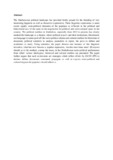Please use this identifier to cite or link to this item:
https://cris.library.msu.ac.zw//handle/11408/2984| Title: | A semiotic reading of ‘munhu wese kuna amai’ in Zimbabwean political discursive realities | Authors: | Saidi, Umali | Keywords: | Semiotic Communicative Performance Expression Mother Ideology |
Issue Date: | 2018 | Publisher: | Taylor & Francis (Routledge) | Series/Report no.: | African Identities; | Abstract: | The Zimbabwean political landscape has provided fertile ground for the breeding of very interesting linguistic as well as discursive expressions. These linguistic expressions to some extent signify socio-political dementia of the populace as reflected in the political and behavioural acts of the same in the negotiation for political and socio-cultural space in the country. The political realities in Zimbabwe, especially from 2013 to present, has clearly marked the landscape as a theatre, where political players and their institutions, illustriously use language to onion-peel-off the socio-political drama and cultural realities for historians to document, political scientists to analyse, journalists to report, the povo to debate and academics to study. Using semiotics, the paper dissects one instance of this linguistic inventive; what has now become a popular expression, ‘munhu wese kuna amai’ (Everyone should go to the mother), among the many, in the Zimbabwean socio-political performance from which various ideological, historical and cultural realities are presented. The paper further argues that such expressions are strategies which reflect efforts by ZANU (PF) to declare, define, demarcate, command, propagate as well as express socio-political and cultural dogmas the populace should adhere to. | URI: | https://www.tandfonline.com/eprint/fMKqgQuiMwcFVYxg8NVy/full http://hdl.handle.net/11408/2984 |
ISSN: | 1472-5843 |
| Appears in Collections: | Research Papers |
Files in This Item:
| File | Description | Size | Format | |
|---|---|---|---|---|
| Abstract.pdf | Abstract | 102.97 kB | Adobe PDF |  View/Open |
Page view(s)
220
checked on Feb 10, 2026
Download(s)
68
checked on Feb 10, 2026
Google ScholarTM
Check
Items in MSUIR are protected by copyright, with all rights reserved, unless otherwise indicated.



